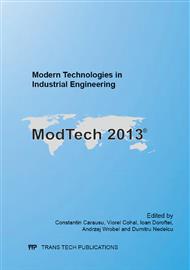p.310
p.316
p.322
p.328
p.334
p.340
p.346
p.351
p.357
Real-Time Monitoring Station for Production Systems
Abstract:
Real-time monitoring of the flow of materials, semi-completed and completed products during production process is necessary practice for every company because of need for optimal production management. Identification of technological operations, parts, products and persons responsible for any production stage is possible using means of processes control devices and automatic identification systems. Paper describes the in-line monitoring station designed for tests of real-time production monitoring methods. Available sources of information are RFiD, bar codes, and vision system. These data sources are integrated into the in-line production monitoring station. Modular production system model or small production system can be placed under the In-line station as an object of monitoring. Advanced PLC integrates control over subsystems and allows communication between hardware and software components of data acquisition system. Data acquired from the in-line research station is stored in a dedicated database, then processed and analysed using MES (Manufacturing Execution System) software.
Info:
Periodical:
Pages:
334-339
DOI:
Citation:
Online since:
November 2013
Authors:
Price:
Сopyright:
© 2014 Trans Tech Publications Ltd. All Rights Reserved
Share:
Citation:


